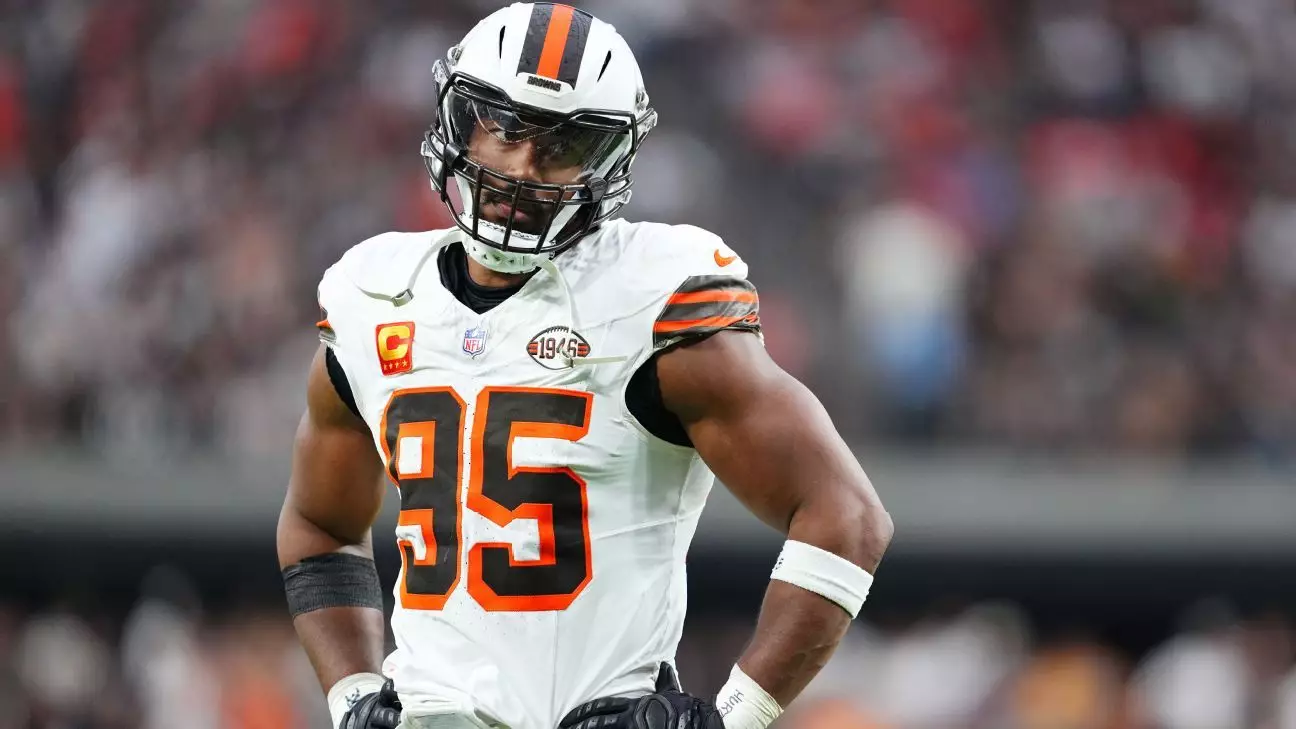Myles Garrett, the standout defensive end for the Cleveland Browns, has made his intentions clear: he wants to be a Cleveland Brown for life. Despite wrestling with yet another disappointing season that has been marred by double-digit losses, the NFL’s reigning Defensive Player of the Year is steadfast in his commitment to the franchise. However, this commitment comes with a significant caveat—Garrett demands clarity on the organization’s future direction. His focus is on immediate success rather than a prolonged rebuilding phase, underscoring a broader narrative of player agency in the modern NFL.
Garrett’s remarks reflect his desire to stay with a franchise that has demonstrated faith in his abilities since drafting him first overall in 2017. “I want to stay loyal to a team that showed loyalty to me,” Garrett said, encapsulating the often complex relationship between NFL players and their organizations. Yet, loyalty cannot exist in a vacuum; it must be reciprocated with a commitment to winning—a sentiment that resonates deeply with fans as well.
During a recent statement, Garrett insisted on the importance of sensible discussions around the Browns’ offseason strategies, particularly regarding the quarterback position. “I’m not trying to rebuild,” he asserted, advocating for a winning mindset that reflects the aspirations of not just the players, but also the passionate fanbase that resides in Cleveland. His remarks initiate an essential conversation about the vision the Browns’ management has for the team in both the immediate and extended future.
The urgency expressed by Garrett highlights a crucial aspect of the NFL today—players seek involvement in decision-making processes that directly affect their careers. The quarterback conundrum is particularly pressing for the Browns. With Dorian Thompson-Robinson slated to start after a tumultuous season, fans have been left to wonder not just about the choice of players, but about the overarching strategy of the organization as a whole. While Thompson-Robinson may provide a fresh perspective, he represents the 40th starting quarterback for the Browns since the franchise returned in 1999, underscoring a bewildering inconsistency that fortunes must change.
Garrett’s faith in the existing leadership under head coach Kevin Stefanski and general manager Andrew Berry adds another layer of complexity. He acknowledged their roles, yet simultaneously called for a more decisive strategy moving forward. “There’s got to be a plan of action,” he stated, hinting at a sense of urgency in holding the organization accountable for its decisions. This plea for transparency is representative of a modern athlete’s desire not only for organizational loyalty but also for transparent communication and accountability from the front office.
Garrett’s on-field mentality has consistently demonstrated his commitment to excellence, and he seeks the same level of investment from the Browns’ management. If the team hopes to keep its star player content and, more importantly, effective, it must prioritize creating a platform that allows him to thrive. The adeptness or lack thereof in decision-making processes can dramatically impact the trajectory of a franchise.
The upcoming offseason presents an opportunity for the Browns to realign and exhibit the commitment to winning that Myles Garrett craves. With two years left on his five-year extension, the time is ripe for the organization to generate additional salary cap relief through a new deal, potentially allowing them the flexibility to address critical roster needs.
That said, Garrett’s tenure in Cleveland thus far has been decidedly mixed; while he has shone in the individual spotlight, with only three playoff appearances under his belt, the lack of team success looms like an albatross. “I want to win right now,” he stated, and that phrase encapsulates both the urgency and discontent emanating from a player who knows his window for greatness is finite.
Myles Garrett’s statement is a clarion call for the Cleveland Browns to define their future. If they hope to keep one of the league’s top talents, they must align their ambitions with the aspirations of a player eager to win championships and forge a lasting legacy. The franchise’s commitment to Garrett must translate into a viable, actionable plan that not only promises stability but also excites a fanbase hungry for success. Only then can both the team and its star player secure a brighter future together.

